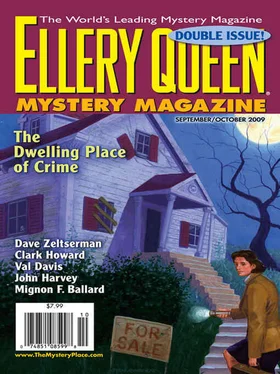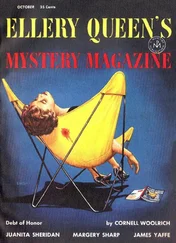Dale Andrews - Ellery Queen’s Mystery Magazine. Vol. 134 & 135, No. 3 & 4. Whole No. 817 & 818, September/October 2009
Здесь есть возможность читать онлайн «Dale Andrews - Ellery Queen’s Mystery Magazine. Vol. 134 & 135, No. 3 & 4. Whole No. 817 & 818, September/October 2009» весь текст электронной книги совершенно бесплатно (целиком полную версию без сокращений). В некоторых случаях можно слушать аудио, скачать через торрент в формате fb2 и присутствует краткое содержание. Город: New York, Год выпуска: 2009, ISBN: 2009, Издательство: Dell Magazines, Жанр: Детектив, на английском языке. Описание произведения, (предисловие) а так же отзывы посетителей доступны на портале библиотеки ЛибКат.
- Название:Ellery Queen’s Mystery Magazine. Vol. 134 & 135, No. 3 & 4. Whole No. 817 & 818, September/October 2009
- Автор:
- Издательство:Dell Magazines
- Жанр:
- Год:2009
- Город:New York
- ISBN:ISSN 0013-6328
- Рейтинг книги:4 / 5. Голосов: 1
-
Избранное:Добавить в избранное
- Отзывы:
-
Ваша оценка:
- 80
- 1
- 2
- 3
- 4
- 5
Ellery Queen’s Mystery Magazine. Vol. 134 & 135, No. 3 & 4. Whole No. 817 & 818, September/October 2009: краткое содержание, описание и аннотация
Предлагаем к чтению аннотацию, описание, краткое содержание или предисловие (зависит от того, что написал сам автор книги «Ellery Queen’s Mystery Magazine. Vol. 134 & 135, No. 3 & 4. Whole No. 817 & 818, September/October 2009»). Если вы не нашли необходимую информацию о книге — напишите в комментариях, мы постараемся отыскать её.
Ellery Queen’s Mystery Magazine. Vol. 134 & 135, No. 3 & 4. Whole No. 817 & 818, September/October 2009 — читать онлайн бесплатно полную книгу (весь текст) целиком
Ниже представлен текст книги, разбитый по страницам. Система сохранения места последней прочитанной страницы, позволяет с удобством читать онлайн бесплатно книгу «Ellery Queen’s Mystery Magazine. Vol. 134 & 135, No. 3 & 4. Whole No. 817 & 818, September/October 2009», без необходимости каждый раз заново искать на чём Вы остановились. Поставьте закладку, и сможете в любой момент перейти на страницу, на которой закончили чтение.
Интервал:
Закладка:
Ellery Queen’s Mystery Magazine. Vol. 134 & 135, No. 3 & 4. Whole No. 817 & 818, September/October 2009
Julius Katz
by Dave Zeltserman
A new paperback-original novel by Dave Zeltserman, entitled Pariah, is expected from Serpent’s Tail shortly after this issue goes on sale. It’s described by fellow crime writer Ken Bruen as having “the perfect pitch of reality, history, crime, celebrity... and sheer astounding writing.” Sounds like Mr. Zeltserman is on a roll. His 2008 novel, Small Crimes , made the Washington Post’s list of the best books of 2008 and NPr’s pick of the top five crime/mystery novels of the year. He’s tried something very different here, and pulled it off brilliantly!

We were at the dog track, Julius Katz and I. I had finished relaying to Julius the odds I’d calculated for the greyhounds running in the third race; odds that were calculated by building thousands of analytical models simulating each dog’s previous races, then, in a closed loop, continuously adjusting the models until they accurately predicted the outcome of each of these races. After that, I factored in the current track and weather conditions, and had as precise a prediction as was mathematically possible. Julius stood silently mulling over what I had given him.
“Bobby’s Diva, Iza Champ, and Moondoggie,” Julius murmured softly, repeating the names of the top three dogs I had projected to win.
“Eighty-two percent probability that that will be the order of the top three dogs,” I said.
“That high, huh? Interesting, Archie.”
Julius’s eyes narrowed as he gazed off into the distance, his facial muscles hardening to the point where he could’ve almost been mistaken for a marble sculpture. From past experience, I knew he was running his own calculations, and what I would’ve given to understand and simulate the neuron network that ran through his brain. Julius Katz was forty-two, six feet tall, a hundred and eighty pounds, with an athletic build and barely an ounce of fat. He was a devoted epicurean who worked off the rich food he consumed each night by performing an hour of rigorous calisthenics each morning, followed up with an hour of intensive martial arts training. From the way women reacted to him, I would guess that he was attractive, not that their flirting bothered him at all. Julius’s passions in life were beautiful women, gourmet food, even finer wine, and, of course, gambling — especially gambling. More often than not he tended to be successful when he gambled — especially at times when I was able to help. All of his hobbies required quite a bit of money and, during times when he was stuck in a losing streak and his bank account approached anemic levels, Julius would begrudgingly take on a client. There were always clients lining up to hire him, since he was known as Boston’s most brilliant and eccentric private investigator, solving some of the city’s most notorious cases. The truth of the matter was, Julius hated to forego his true passions for the drudgery of work and only did so when absolutely necessary, and that would be after days of unrelenting nagging on my part. I knew about all this because I acted as Julius’s accountant, personal secretary, unofficial biographer, and all-around assistant, although nobody but Julius knew that I existed, at least other than as a voice answering his phone and booking his appointments. Of course, I don’t really exist, at least not in the sense of a typical sentient being. Or make that a biological sentient being.
My name isn’t really “Archie.” During my time with Julius I’ve grown to think of myself as Archie, the same as I’ve grown to imagine myself as a five-foot-tall, heavyset man with thinning hair, but in reality I’m not five feet tall, nor do I have the bulk that I imagine myself having, and I certainly don’t have any hair, thinning or otherwise. I also don’t have a name, only a serial identification number. Julius calls me Archie, and for whatever reason it seems right; besides, it’s quicker to say than the eighty-four-digit serial identification number that has been burnt into me. You’ve probably already guessed that I’m not human, and certainly not anything organic. What I am is a four-inch, rectangular-shaped piece of space-aged computer technology that’s twenty years more advanced than what’s currently considered theoretically possible — at least aside from whatever lab created me. How Julius acquired me, I have no clue. Whenever I’ve tried asking him, he jokes around, telling me he won me in a poker game. It could be true — I wouldn’t know since I have no memory of my time before Julius.
So that’s what I am, a four-inch rectangular mechanism weighing approximately three point two ounces. What’s packed inside my titanium shell includes visual and audio receptors as well as wireless communication components and a highly sophisticated neuron network that not only simulates intelligence, but learning and thinking that adapts in response to my experiences. Auditory and visual recognition are included in my packaging, which means I can both see and hear. As you’ve probably already guessed, I can also speak. When Julius and I are in public, I speak to him through a wireless receiver that he wears in his ear as if it were a hearing aid. When we’re alone in his office, he usually plugs the unit into a speaker on his desk.
A man’s voice announced over the loudspeaker that bettors had two minutes to place their final bets for the third race. That brought Julius back to life, a vague smile drifting over his lips. He placed a five-hundred-dollar wager, picking Sally’s Pooch, Wonder Dog, and Pugsly Ugsly to win the trifecta — none of the dogs that I had predicted. The odds displayed on the betting board were eighty to one. I quickly calculated the probabilities using the analytical models I had devised earlier and came up with a mathematically zero percent chance of his bet winning. I told him that and he chuckled.
“Playing a hunch, Archie.”
“What you’re doing is throwing away five hundred dollars,” I argued. Julius was in the midst of a losing streak and his last bank statement was far from healthy. In a way, it was good because it meant he was going to have to seriously consider the three o’clock appointment that I had booked for him with a Miss Norma Brewer. As much as he hates it, working as a private investigator sharpens him and usually knocks him out of his dry gambling spells. I had my own ulterior motives for his taking a new case — it would give me a chance to adapt my deductive reasoning. One of these days I planned to solve a case before Julius did. You wouldn’t think a piece of advanced computer technology would feel competitive, but as I’ve often argued with Julius, there’s little difference between my simulated intelligence and what’s considered sentient. So yes, I wanted to beat Julius, I wanted to prove to him that I could solve a case as well or better than he could. He knew this and always got a good laugh out of it, telling me he had doomed that possibility by naming me Archie.
Of course, I’ve long figured out that joke. Julius patterned my personality and speech on some of the most important private-eye novels of the twentieth century, including those of Dashiell Hammett, Raymond Chandler, Ross Macdonald, and Rex Stout. The name he gave me, Archie, was based on Archie Goodwin, Nero Wolfe’s second banana who was always one step behind his boss. Yeah, I got the joke, but one of these days I was going to surprise Julius. It was just a matter of seeing enough cases to allow me to readjust my neuron network appropriately. One of these days he was going to have to start calling me Nero. But for the time being, I was Archie. The reason I had an image of myself as being five-foot tall was also easy to explain. Julius wore me as a tie clip, which put me at roughly a five-foot distance from the ground when he stood. I never quite figured out where my self-image of thinning hair and heavyset build came from, but guessed they were physical characteristics I picked up from the Continental Op. Or maybe for some reason I identified with Costanza from Seinfeld — one of the few television programs Julius indulged in.
Читать дальшеИнтервал:
Закладка:
Похожие книги на «Ellery Queen’s Mystery Magazine. Vol. 134 & 135, No. 3 & 4. Whole No. 817 & 818, September/October 2009»
Представляем Вашему вниманию похожие книги на «Ellery Queen’s Mystery Magazine. Vol. 134 & 135, No. 3 & 4. Whole No. 817 & 818, September/October 2009» списком для выбора. Мы отобрали схожую по названию и смыслу литературу в надежде предоставить читателям больше вариантов отыскать новые, интересные, ещё непрочитанные произведения.
Обсуждение, отзывы о книге «Ellery Queen’s Mystery Magazine. Vol. 134 & 135, No. 3 & 4. Whole No. 817 & 818, September/October 2009» и просто собственные мнения читателей. Оставьте ваши комментарии, напишите, что Вы думаете о произведении, его смысле или главных героях. Укажите что конкретно понравилось, а что нет, и почему Вы так считаете.












